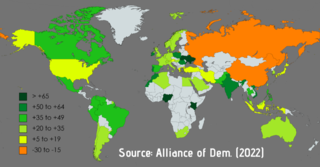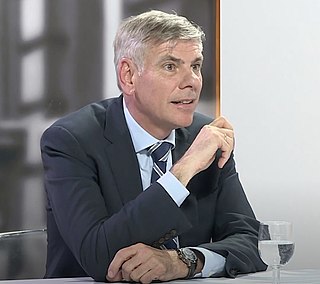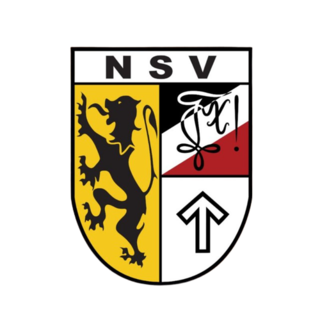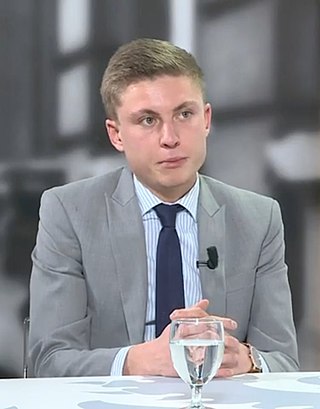
Euroscepticism, also spelled as Euroskepticism or EU-scepticism, is a political position involving criticism of the European Union (EU) and European integration. It ranges from those who oppose some EU institutions and policies, and seek reform, to those who oppose EU membership and see the EU as unreformable. The opposite of Euroscepticism is known as pro-Europeanism, or European Unionism.

Vlaams Blok was the name of a Belgian far-right and secessionist political party with an anti-immigration platform. Its ideologies embraced Flemish nationalism, calling for the independence of Flanders.

The New Flemish Alliance is a Flemish nationalist and conservative political party in Belgium. The party was established in 2001 by the right-leaning faction of the centrist-nationalist People's Union (VU).

Philip Michel Frans "Filip" Dewinter is a Belgian politician, journalist and commentator. He is one of the leading members of Vlaams Belang, a right-wing Flemish nationalist and secessionist political party.
Vlaams Belang is a Flemish nationalist and right-wing populist political party in the Flemish Region and Brussels Capital Region of Belgium. It is widely considered to be on the political far-right, although it self-describes as centre-right.

The Nationalistische Studentenvereniging (NSV) (Dutch; "Nationalist Student Association") is a far-right Flemish nationalist student political group in Belgium, with chapters in Antwerp, Brussels, Ghent, Leuven, West Flanders (including Bruges, Roeselare, Ostend and Kortrijk), Hasselt and Mechelen.

Hans Van Themsche is a Belgian student who, on 11 May, 2006, shot three people, killing two and severely injuring another, before being shot by police and incapacitated. He was sentenced to life in prison in 2008.
The 70-point plan was a proposal drafted in 1992 by the Belgian political party Vlaams Blok as an "answer to the problem of immigrants." The full title of the plan was "Immigration: the solutions. 70 proposals for the solution of the problem of aliens".

The 0110 concerts, held on October 1, 2006 in Antwerp, Brussels, Charleroi and Ghent, were organised by dEUS frontman Tom Barman, Arno Hintjens and Frederik Sioen to promote tolerance in Belgian society, and "against Vlaams Belang, extremism and gratuitous violence".

Thierry Henri Philippe Baudet is a Dutch far-right politician, author and self-declared conspiracy theorist. He is the founder and leader of Forum for Democracy (FvD), and has been a member of the House of Representatives since 2017. He also serves as the party's parliamentary leader. He is a controversial politician due to his political views, and his use of personal attacks against his opponents.
M.J.R.L. "Marcel" de Graaff is a Dutch politician. He has been a Member of the European Parliament (MEP) for the Netherlands since February 2020, and previously served between 2014 and 2019. He represented the Party for Freedom (PVV) and was co-president of the Europe of Nations and Freedom. De Graaff was a member of the Senate of the Netherlands for the PVV from 2011 to 2014.
Forum for Democracy is a far-right political party in the Netherlands, founded as a think tank by Thierry Baudet and Henk Otten in 2016. The party first participated in elections in the 2017 general election, winning two seats in the House of Representatives.

Oikofobie: De angst voor het eigene is a 2013 Dutch book written by Thierry Baudet.

Petr Bystron is a German politician. He was a candidate for Munich North for the Bundestag during the German federal election in 2017 for the far-right Alternative for Germany party. Czech intelligent service BIS presented evidence in 2024 that Bystron was bribed by Russia to represent its interests in the European Parliament and German Bundestag.
In the run up to the 2024 Belgian federal election, various organisations carry out opinion polling to gauge voting intention in Belgium. The date range for these polls are from the 2019 Belgian federal election, held on 25 May, to the present day. The results of nationwide polls are usually numerically split into the three Belgian regions: Flanders, Brussels and Wallonia. Federal seat projections for the Chamber of Representatives are presented together under these regional polls. The federal election will be part of a group of elections which also include the regional elections and the European elections. Some polls might be undefined voting intentions without differentiating between the elections.
Identity and Democracy is a right-wing to far-right political group of the European Parliament, launched on 13 June 2019 for the Ninth European Parliament term. It is composed of nationalist, right-wing populist and eurosceptic national parties from ten European states. It is the successor to the Europe of Nations and Freedom group formed during the eighth term.
A large part of the right-wing German party Alternative for Germany (AfD) supports Russia, its foreign policy, and its allies.

Sam van Rooy is a Belgian-Flemish politician for Vlaams Belang, author, blogger and former professional cyclist.

Filip Brusselmans is a Belgian politician and political activist.
Events in the year 2024 in Belgium.











